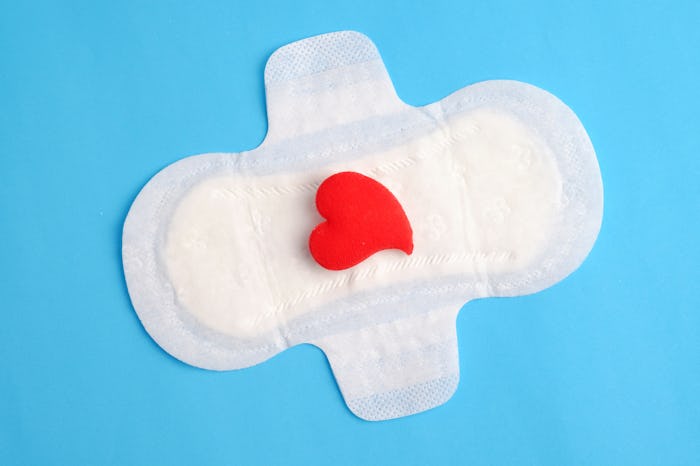Life

9 Things Your Period Is Trying To Tell You About Your Health
Wouldn't it be great if you could just get monthly text updates from your body instead of a period? "Hey girl, you aren't pregnant. See you next month." Every aspect of your cycle would be so much easier. Unfortunately, the real world does not have such technology yet. So you're stuck trying to decode what your period is trying to tell you about your health.
Once you know the signs, however, your period can tell you a lot about your health. In fact, everything from your stress levels to potential STIs can alter your period's timing, appearance, and accompanying pain levels. Whether your underlying cause for period pain is a condition such as endometriosis, or an unexpected change in hormones, the result is often the same: something about your menstrual cycle seems a bit off.
Granted, it can be difficult to keep track of your period's every change, especially when you aren't trying to conceive. But this doesn't mean you need to keep a journal outlining every period in minute detail. Paying attention to your body, and taking note of your period's general duration, flow, and pain level, can go a long way toward helping you notice health issues as they arise.
1You Have Thyroid Issues
Most people probably don't think twice about the thyroid gland in your neck, but it can definitely lead to some menstrual oddities if it's out of whack. According to the Office On Women's Health, thyroid disease may make your period heavy, light, or nonexistent. If this sounds familiar, visit your doctor to see how your thyroid is functioning.
2You Are Stressed
At first, the idea of making your period go away sounds great. One less thing to worry about, right? But it may indicate some serious health problems. For instance, if you're very stressed, then you may experience irregular periods or stop having them altogether, according to Everyday Health. And when your stress levels start affecting your body's ability to function, it's probably time to learn some new coping techniques.
3You Suffer From PCOS
Again, if your period does a disappearing act, it's usually a cause for concern. And as noted in the Mayo Clinic, signs of polycystic ovary syndrome (PCOS) include periods that are infrequent, absent, or even longer than usual. If your menstruation seems to have no schedule at all, then it's probably a good reason to see your doctor.
4You Have A Potential STD
Even the color of your menstrual blood can tell you a lot about your health, provided you're OK with checking out this particular aspect of your body. For instance, if your period bloods appears orange, then it may mean your blood has combined with cervical fluid, thanks to the presence of an STD, as noted in Glamour. This pretty much calls for an immediate trip to the physician.
5You're Anemic
Sometimes the periods themselves are the culprit of a health problem. According to WebMD, very heavy bleeding may result in iron-deficiency anemia. Yes, it's possible to menstruate yourself into a medical condition.
6You Have A Disturbance In Hormone Levels
Is there anything hormones don't affect? According to Medical News Today, changes in your estrogen or progesterone levels may lead to irregular periods. If your cycle seems to have a mind of its own, don't hesitate to get a checkup. You want those hormone levels stable.
7You Have Polyps
Periods that are exceptionally heavy are not normal. According to the Center for Menstrual Disorders & Reproductive Choice, endometrial polyps are an extremely common cause for heavy bleeding. Polyps may also cause bleeding in between your regular cycles.
8You Have Fibroids
If polyps aren't the cause of your problems, then fibroids are another very likely candidate. According to the Office On Women's Health, the muscular tumors known as fibroids are a common cause of painful, heavy menstrual bleeding. This almost definitely calls for a doctor's visit.
9You Suffer From Endometriosis
Basically, endo is the worst. As noted in the Mayo Clinic, debilitating pelvic pain, especially around the time of your period, is a common sign of endometriosis. Fortunately, help is available, so you don't have to suffer so much every month.